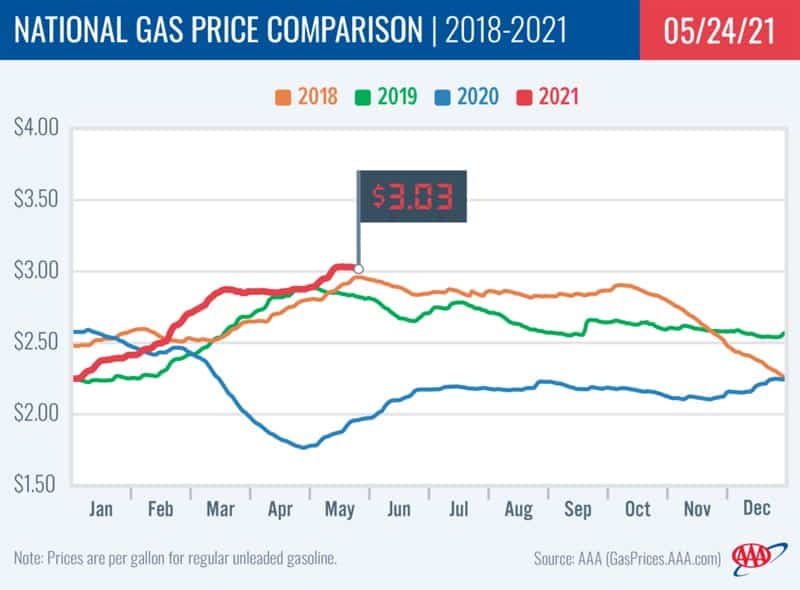Americans are getting back on the road though they will pay highest gas prices since 2014 over the weekend
Washington D.C.—Motorists hitting the road this week to celebrate the unofficial kick-off to summer will be greeted with the most expensive Memorial Day weekend gas prices since 2014.
The national average has stabilized following the Colonial Pipeline cyberattack, but pump prices are likely to fluctuate leading up to the holiday weekend. Over the past weekend, the national gas price average declined a penny to $3.03, the first decrease in two weeks.
While barely cheaper on the week, the average is 17 cents more than last month and $1.12 more expensive than last year.
“AAA expects 37 million Americans to travel, mostly by car and plane, for the Memorial Day holiday weekend. That is a 60 percent increase over last year’s holiday and a strong indication that summer travel is going to be largely popular,” said Jeanette McGee, AAA spokesperson.
“With the increase in travel demand, gas prices are going to be expensive no matter where you fill up.”
While the Colonial Pipeline is back in operation and deliveries are in progress, some stations in the southeast continue to experience supply strain. This is likely to extend into the holiday weekend, but motorists will be able to fill up.
“Holiday road trippers may come across some gas stations with low fuel supply in popular travel destinations, like beaches, mountains or national parks. However, markets are not expected to be fuel-less, like we saw in the wake of the pipeline shutdown,” added McGee.
Quick Stats
The nation’s top 10 largest weekly changes: Hawaii (+4 cents), Indiana (-4 cents), California (+3 cents), Oregon (+3 cents), Colorado (+3 cents), Maryland (−3 cents), Georgia (−3 cents), Oklahoma (−3 cents), Illinois (−3 cents) and Wisconsin (−2 cents).
The nation’s top 10 least expensive markets: Louisiana ($2.71), Mississippi ($2.71), Missouri ($2.73), Texas ($2.74), Oklahoma ($2.75), Arkansas ($2.76), Kansas ($2.83), Minnesota ($2.83), Alabama ($2.83) and North Dakota ($2.84).
Oil Market Dynamics
At the close of Friday’s formal trading session, WTI increased by $1.64 to settle at $63.58. While a stronger dollar contributed to higher prices for the day, on the week crude prices declined as the market remains concerned that increasing coronavirus infections around the world could reduce crude consumption this year. Additionally, new market concerns about inflation and the Energy Information Administration’s (EIA) weekly report revealing that total domestic crude inventories increased by 1.3 million bbl to 486 million bbl helped to reduce crude prices last week. If EIA’s next weekly report shows another increase in crude stocks, prices could decrease further this week.



Comments are closed.